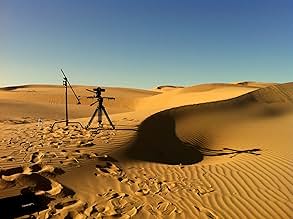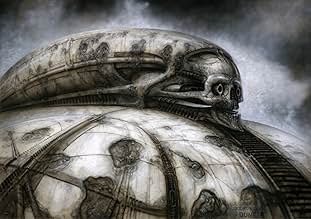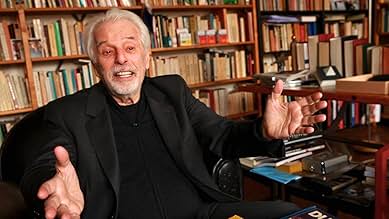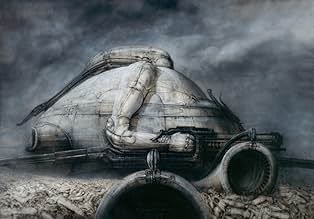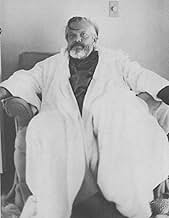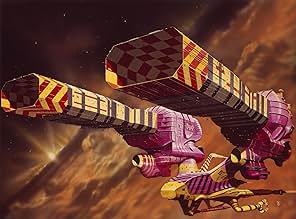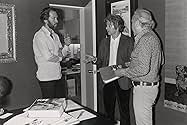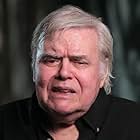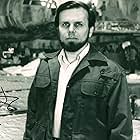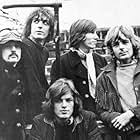The story of cult film director Alejandro Jodorowsky's ambitious but ultimately doomed film adaptation of the seminal science fiction novel.The story of cult film director Alejandro Jodorowsky's ambitious but ultimately doomed film adaptation of the seminal science fiction novel.The story of cult film director Alejandro Jodorowsky's ambitious but ultimately doomed film adaptation of the seminal science fiction novel.
- Awards
- 12 wins & 27 nominations total
Douglas Trumbull
- Self
- (archive footage)
Dan O'Bannon
- Self
- (archive footage)
- (voice)
Pink Floyd
- Themselves
- (archive footage)
Salvador Dalí
- Self
- (archive footage)
Featured reviews
I couldn't resist the urge to paraphrase the Tenacious D lyric for this review's title, cause I can't imagine anything more fitting.
I watched this documentary in anticipation of Denis Villeneuve's Dune, trying to better understand why adapting Dune in film has been such a challenge. One answer I came away with is that the sheer magnitude, complexity and transcendental nature of the source material triggers the fantasy-turned-burden of creating the greatest film in the history of cinema. It's like the Dune film has been the holy grail of modern sci-fi filmmaking. Jodorowsky was the first to chase it and was - and still very much is - convinced he had it. If only those pesky studio execs could see past the director's unconventional M.O. and cough up the money.
Jodorowsky's passionate and fascinating retelling of this epic adventure in filmmaking alone is enough to fill the screen for the whole 90 minutes, but we also get regaled with a good amount of the original concept art, animated storyboards and music that give us a taste of the project's intended aesthetic. The testimonies of some of the artists involved in the project help ground this implausible-sounding tale to reality.
I don't think the documentary makes any attempt to be objective, so it shouldn't be viewed as a complete chronicle of how this ambitious project went down. It's more a character piece on Jodorowsky himself, as a - slightly unhinged, slightly megalomaniac - uncompromising visionary, who at that one point in history managed to recruit an "army" (his term) of avant-garde talent (a jaw-dropping list of huge names from all over the artistic world from Orson Welles to Mick Jagger, from Salvador Dali to Pink Floyd).
Jodorowski the person is intriguing and flawed in equal measures. He reminded me a lot of Ayn Rand's Howard Roark (The Fountainhead) in the way that he put his art before anything and anyone else, displaying hints of cruelty: he admits to subjecting his 12-year-old son to a 2-year punishing training regime in preparation for his role as Paul Atreides, then he casually uses rape and "not respecting" women as a metaphor for creating great art (a bit you'd think the director would have chosen to cut out so as to protect the old man in this otherwise hagiographical portrayal).
In all, it's well worth a watch, especially in light of 2020's Dune, but it's good going into it knowing what to expect and what not to expect.
I watched this documentary in anticipation of Denis Villeneuve's Dune, trying to better understand why adapting Dune in film has been such a challenge. One answer I came away with is that the sheer magnitude, complexity and transcendental nature of the source material triggers the fantasy-turned-burden of creating the greatest film in the history of cinema. It's like the Dune film has been the holy grail of modern sci-fi filmmaking. Jodorowsky was the first to chase it and was - and still very much is - convinced he had it. If only those pesky studio execs could see past the director's unconventional M.O. and cough up the money.
Jodorowsky's passionate and fascinating retelling of this epic adventure in filmmaking alone is enough to fill the screen for the whole 90 minutes, but we also get regaled with a good amount of the original concept art, animated storyboards and music that give us a taste of the project's intended aesthetic. The testimonies of some of the artists involved in the project help ground this implausible-sounding tale to reality.
I don't think the documentary makes any attempt to be objective, so it shouldn't be viewed as a complete chronicle of how this ambitious project went down. It's more a character piece on Jodorowsky himself, as a - slightly unhinged, slightly megalomaniac - uncompromising visionary, who at that one point in history managed to recruit an "army" (his term) of avant-garde talent (a jaw-dropping list of huge names from all over the artistic world from Orson Welles to Mick Jagger, from Salvador Dali to Pink Floyd).
Jodorowski the person is intriguing and flawed in equal measures. He reminded me a lot of Ayn Rand's Howard Roark (The Fountainhead) in the way that he put his art before anything and anyone else, displaying hints of cruelty: he admits to subjecting his 12-year-old son to a 2-year punishing training regime in preparation for his role as Paul Atreides, then he casually uses rape and "not respecting" women as a metaphor for creating great art (a bit you'd think the director would have chosen to cut out so as to protect the old man in this otherwise hagiographical portrayal).
In all, it's well worth a watch, especially in light of 2020's Dune, but it's good going into it knowing what to expect and what not to expect.
The story of cult film director Alejandro Jodorowsky's ambitious but ultimately doomed film adaptation of Frank Herbert's seminal science fiction novel.
This is the missing link of science fiction history. Between 1960 and 1980, the world of science fiction evolved from cheesy robots and mad scientists to something far more visionary. Other given credit are "Alien", "2001", "Star Wars" and others... but perhaps it was this film that never got made.
H.R. Giger? Dan O'Bannon? Orson Welles? This is an incredible story, and really bridges a gap. Those watching "Dark Star" today (2015) might think it is a rather silly film, but put back into tits context and influence, it may be a much bigger piece of history than many think. How big would "Dune" have been?
This is the missing link of science fiction history. Between 1960 and 1980, the world of science fiction evolved from cheesy robots and mad scientists to something far more visionary. Other given credit are "Alien", "2001", "Star Wars" and others... but perhaps it was this film that never got made.
H.R. Giger? Dan O'Bannon? Orson Welles? This is an incredible story, and really bridges a gap. Those watching "Dark Star" today (2015) might think it is a rather silly film, but put back into tits context and influence, it may be a much bigger piece of history than many think. How big would "Dune" have been?
"Visionary" is the most misused term in film circles of late, thrown around by idiots who wouldn't know a D.W. Griffith film from a Warhol. Such is the fate of Alexandro (proper spelling) Jodorowsky, a darling of cultists.
Unlike the particularly lame set of experts rounded up here (fan boys as film critics and untalented film directors Richard Stanley and Nicolas Winding Refn), I was a film buff in the '60s and '70s and properly placed Alexandro's work ("El Topo", "Fando & Lis", "The Holy Mountain") in the context of his betters: Glauber Rocha from Brazil and the fabulous European surrealist Arrabal.
Frank Pavich who directed this documentary fails to mention even in passing that "Fando and Lis" was adapted by AJ from a play by Arrabal. "Viva la Muerte!" by Arrabal was just as influential a midnight movie at the outset of the '70s as AJ's "El Topo", and all the art-house directors of that era owed plenty to the innovations of Rocha in a series of films from which "Antonio das Mortes" stood out, and would still be a reference point if folks did their homework.
In covering AJ's work this documentary is incomplete and misleading. The most famous anecdote regarding "The Holy Mountain" concerns star Dennis Hopper going crazy during filming and leaving the set, forcing AJ to replace him. Nowhere is that level of historical research encountered here.
Instead we have AJ pontificating, gesticulating, and basically acting the part of "the mad genius" for Pavich's camera. This routine, favored by Werner Herzog in recent decades gets old in a hurry and made watching "J's 'Dune" a real chore. I interviewed Terry Gilliam in 1981 in Manhattan on his promo junket for the release of "The Time Bandits" and he behaved in person one-on-one quite similar to the way Jodo acts here. Both men are so full of enthusiasm and passion concerning making movies that they literally seem about to blow a gasket at any moment.
Both Jodorowsky and Gilliam have become famous over the years for the outlandishness (and scale) of their projects, and their becoming folk heroes by going Don Quixote-like up against the windmills/giants of the Film Establishment, i.e., the guys who hold the purse-strings.
Much is made here of Hollywood's inability to see the power of AJ's meticulously (and permanently) enshrined shooting script that is bound in hardback the size of an unexpurgated Webster's dictionary. Both he and Gilliam seem to have a mental block against recognizing the difference between making a large-scale, say mature David Lean- scale, movie and writing the Great American Novel or crafting the ultimate Broadway Play. Self-appointed "visionaries" need not apply - only fools like Bob Guccione and his "most expensive porn film of all time" Caligula can do that. Artists like these should sensibly follow in the footsteps of avant-garde filmmakers, Maya Deren, Ed Emshwiller, Stan Brakhage and Stan Vanderbeek: create independent, no-budget, uncompromising underground cinema. Leave the $200,000,000 projects to hacks like Michael Bay.
It was Dino De Laurentiis (along with Joseph E. Levine and Alexander Salkind) who initiated the era of big-budgets we currently live with: back when Dune by AJ was being worked on and shopped the entire film industry was functioning under very tight budgetary restrictions following the near-collapse of the studios in 1969: no film in the '70s was being green-lighted with a budget as high as $15,000,000, which Dune would entail.
For the record, it was 1976 when Levine's "A Bridge Too Far", Dino's "King Kong" and Salkind's "Superman" were independently produced at much higher budgets, opening the floodgates. And not coincidentally it was Dino, through his daughter, who ended up producing the David Lynch flop of "Dune".
So the doc's argument about AJ's war with stupid studio execs is completely off- base and ignorantly presented -their hands were tied at that time.
Worse than that, the movie's implication about the power and influence of AJ's Dune, even without it being made, is 180 degrees off the mark. Sure, we see trotted out a who's who of ultra-creative talent that was working on preparing the movie: Giger, Moebius, O'Bannon, even hangers-on like Welles and Dali. Ridley Scott is rightly shown to be the chief recipient of the fruits of their labors -going from the promising art-house director of "The Duellists" to fame and fortune (via hiring AJ's technicians) with increasingly bigger- canvas epics like "Alien", "Blade Runner" and ultimately "Gladiator" and many others all of which not coincidentally resemble the '60s epics that sank Hollywood's fortunes and led to that moratorium on big-budget projects in the first place.
The legacy of this unfinished film is not launching top technical and creative talent in a host of blockbusters but rather the industry's ongoing fascination with flashy, mindless crap, currently emblazoned by the application of 3-D (a tarnished medium from the early '50s) to so many pictures as well as fake IMAX (not using the IMAX photographic system) to market the junk.
What Pavich presents as AJ's strengths are in fact his fatal flaws. Rounding up the top talent - it seems like he has the Midas touch in finding the best in each field, does not disguise the obvious fact that had he actually been able to make "Dune", AJ would be calling all the shots, like a Robert Rodriguez (writer/director/cameraman/editor). Evidence of this creeps into the doc with the segment dealing with Doug Trumbull, who is sloughed off as arrogant or not a team player when AJ rejects his participation out of hand, when in fact it is obvious that AJ is the arrogant s.o.b., not Doug.
AJ would have a firmer and more legitimate place in film history had he remained independent and tackled smaller-scale films that expressed exactly what he wanted to say, a la the models of Jim Jarmusch or Woody Allen.
Unlike the particularly lame set of experts rounded up here (fan boys as film critics and untalented film directors Richard Stanley and Nicolas Winding Refn), I was a film buff in the '60s and '70s and properly placed Alexandro's work ("El Topo", "Fando & Lis", "The Holy Mountain") in the context of his betters: Glauber Rocha from Brazil and the fabulous European surrealist Arrabal.
Frank Pavich who directed this documentary fails to mention even in passing that "Fando and Lis" was adapted by AJ from a play by Arrabal. "Viva la Muerte!" by Arrabal was just as influential a midnight movie at the outset of the '70s as AJ's "El Topo", and all the art-house directors of that era owed plenty to the innovations of Rocha in a series of films from which "Antonio das Mortes" stood out, and would still be a reference point if folks did their homework.
In covering AJ's work this documentary is incomplete and misleading. The most famous anecdote regarding "The Holy Mountain" concerns star Dennis Hopper going crazy during filming and leaving the set, forcing AJ to replace him. Nowhere is that level of historical research encountered here.
Instead we have AJ pontificating, gesticulating, and basically acting the part of "the mad genius" for Pavich's camera. This routine, favored by Werner Herzog in recent decades gets old in a hurry and made watching "J's 'Dune" a real chore. I interviewed Terry Gilliam in 1981 in Manhattan on his promo junket for the release of "The Time Bandits" and he behaved in person one-on-one quite similar to the way Jodo acts here. Both men are so full of enthusiasm and passion concerning making movies that they literally seem about to blow a gasket at any moment.
Both Jodorowsky and Gilliam have become famous over the years for the outlandishness (and scale) of their projects, and their becoming folk heroes by going Don Quixote-like up against the windmills/giants of the Film Establishment, i.e., the guys who hold the purse-strings.
Much is made here of Hollywood's inability to see the power of AJ's meticulously (and permanently) enshrined shooting script that is bound in hardback the size of an unexpurgated Webster's dictionary. Both he and Gilliam seem to have a mental block against recognizing the difference between making a large-scale, say mature David Lean- scale, movie and writing the Great American Novel or crafting the ultimate Broadway Play. Self-appointed "visionaries" need not apply - only fools like Bob Guccione and his "most expensive porn film of all time" Caligula can do that. Artists like these should sensibly follow in the footsteps of avant-garde filmmakers, Maya Deren, Ed Emshwiller, Stan Brakhage and Stan Vanderbeek: create independent, no-budget, uncompromising underground cinema. Leave the $200,000,000 projects to hacks like Michael Bay.
It was Dino De Laurentiis (along with Joseph E. Levine and Alexander Salkind) who initiated the era of big-budgets we currently live with: back when Dune by AJ was being worked on and shopped the entire film industry was functioning under very tight budgetary restrictions following the near-collapse of the studios in 1969: no film in the '70s was being green-lighted with a budget as high as $15,000,000, which Dune would entail.
For the record, it was 1976 when Levine's "A Bridge Too Far", Dino's "King Kong" and Salkind's "Superman" were independently produced at much higher budgets, opening the floodgates. And not coincidentally it was Dino, through his daughter, who ended up producing the David Lynch flop of "Dune".
So the doc's argument about AJ's war with stupid studio execs is completely off- base and ignorantly presented -their hands were tied at that time.
Worse than that, the movie's implication about the power and influence of AJ's Dune, even without it being made, is 180 degrees off the mark. Sure, we see trotted out a who's who of ultra-creative talent that was working on preparing the movie: Giger, Moebius, O'Bannon, even hangers-on like Welles and Dali. Ridley Scott is rightly shown to be the chief recipient of the fruits of their labors -going from the promising art-house director of "The Duellists" to fame and fortune (via hiring AJ's technicians) with increasingly bigger- canvas epics like "Alien", "Blade Runner" and ultimately "Gladiator" and many others all of which not coincidentally resemble the '60s epics that sank Hollywood's fortunes and led to that moratorium on big-budget projects in the first place.
The legacy of this unfinished film is not launching top technical and creative talent in a host of blockbusters but rather the industry's ongoing fascination with flashy, mindless crap, currently emblazoned by the application of 3-D (a tarnished medium from the early '50s) to so many pictures as well as fake IMAX (not using the IMAX photographic system) to market the junk.
What Pavich presents as AJ's strengths are in fact his fatal flaws. Rounding up the top talent - it seems like he has the Midas touch in finding the best in each field, does not disguise the obvious fact that had he actually been able to make "Dune", AJ would be calling all the shots, like a Robert Rodriguez (writer/director/cameraman/editor). Evidence of this creeps into the doc with the segment dealing with Doug Trumbull, who is sloughed off as arrogant or not a team player when AJ rejects his participation out of hand, when in fact it is obvious that AJ is the arrogant s.o.b., not Doug.
AJ would have a firmer and more legitimate place in film history had he remained independent and tackled smaller-scale films that expressed exactly what he wanted to say, a la the models of Jim Jarmusch or Woody Allen.
I found that my public library has this BluRay edition of this 'movie'. There were zero online requests for it and the cover art looks interesting. So I snagged it.
And last night I popped the disc in. Quite a lot of the first part is just talking to set the stage and explain who Jodorowsky is and what kind of movies he made. As it moves along it gets more interesting as we are shown some of the drawings and the out-of-this-world concepts in this 'Dune' movie. That of course never got made.
This is a great program for dune-fan-atics. For me is was just of mild interest. I watched some, skipped forward some, and never watched it to its conclusion. I just wasn't that interested in a movie that never got made.
And last night I popped the disc in. Quite a lot of the first part is just talking to set the stage and explain who Jodorowsky is and what kind of movies he made. As it moves along it gets more interesting as we are shown some of the drawings and the out-of-this-world concepts in this 'Dune' movie. That of course never got made.
This is a great program for dune-fan-atics. For me is was just of mild interest. I watched some, skipped forward some, and never watched it to its conclusion. I just wasn't that interested in a movie that never got made.
This documentary tells the story of director Alejandro Jodorowsky's unfinished masterpiece: his attempt to produce a film adaptation of Frank Herbert's sprawling science-fiction novel 'Dune' in the mid-1970s -- a project which was never completed, in part because it collapsed under the weight of the director's incredibly ambitious vision for the movie. It was to have been a larger-than-life epic, as grand as Stanley Kubrick's '2001.'
All that survives of Jodorowsky's 'Dune' are the script, storyboards, and concept artwork. Using these, combined with talking-heads interviews of those involved, the documentary tries to show us how the finished film would have looked.
What makes all this so captivating are the interviews with Jodorowsky himself, and his incredible passion as he recounts the tale of an unfinished project from 40 years ago. Entering into Jodorowsky's world is like falling into a visionary dream where anything and everything is possible. And as his vision progresses, it becomes more and more ambitious: Salvador Dalì, Mick Jagger, and Orson Welles agree to star. Dan O'Bannon and H.R. Giger will design the sets and costumes. Pink Floyd will provide the score. It's hard to imagine a more ambitious movie, considering the technical limitations of the time.
Yet, as the documentary shows, the ripples from this never-completed, ahead-of-its-time film spread out in many directions, inspiring different ideas that made their way into later films such as 'Star Wars' and 'Alien' -- and which continue to inspire filmmakers today.
All that survives of Jodorowsky's 'Dune' are the script, storyboards, and concept artwork. Using these, combined with talking-heads interviews of those involved, the documentary tries to show us how the finished film would have looked.
What makes all this so captivating are the interviews with Jodorowsky himself, and his incredible passion as he recounts the tale of an unfinished project from 40 years ago. Entering into Jodorowsky's world is like falling into a visionary dream where anything and everything is possible. And as his vision progresses, it becomes more and more ambitious: Salvador Dalì, Mick Jagger, and Orson Welles agree to star. Dan O'Bannon and H.R. Giger will design the sets and costumes. Pink Floyd will provide the score. It's hard to imagine a more ambitious movie, considering the technical limitations of the time.
Yet, as the documentary shows, the ripples from this never-completed, ahead-of-its-time film spread out in many directions, inspiring different ideas that made their way into later films such as 'Star Wars' and 'Alien' -- and which continue to inspire filmmakers today.
Did you know
- TriviaHollywood studios would only let Alejandro Jodorowsky make the film provided that it would be 1h 50 mins long. Jodorowsky declined, reportedly stating that he wanted to make approximately a 15 hour long film. This is a common misconception- he never planned that the actual movie was going to be 15-20 hours, he made this statement in a fit of passion that his artistry would not be confined or compromised by a running time restriction (the studios were asking for 90-120 min running time for profit reasons) asserting that he will make the film as long as he wants it to be, and not because some suit wants more money. While the "Dune Book" being a massive tome; held a script, a full storyboard, and numerous conceptual designs and art work with a budget breakdown it's easy to assume and misconstrued that the finished product would have been over 12 hours.
- Quotes
Alejandro Jodorowsky: What is the goal of the life? It's to create yourself a soul. For me, movies are an art... more than an industry. And its the search of the human soul... as painting, as literature, as poetry. Movies are that for me.
- ConnectionsFeatured in Half in the Bag: 2014 Movie Catch-up: Part 2 (2014)
Details
- Release date
- Countries of origin
- Official sites
- Languages
- Also known as
- «Дюна» Ходоровського
- Filming locations
- The Domes, Casa Grande, Arizona, USA(Scenes deleted)
- Production companies
- See more company credits at IMDbPro
Box office
- Gross US & Canada
- $647,280
- Opening weekend US & Canada
- $36,018
- Mar 23, 2014
- Gross worldwide
- $662,736
- Runtime1 hour 30 minutes
- Color
- Sound mix
- Aspect ratio
- 1.78 : 1
Contribute to this page
Suggest an edit or add missing content








